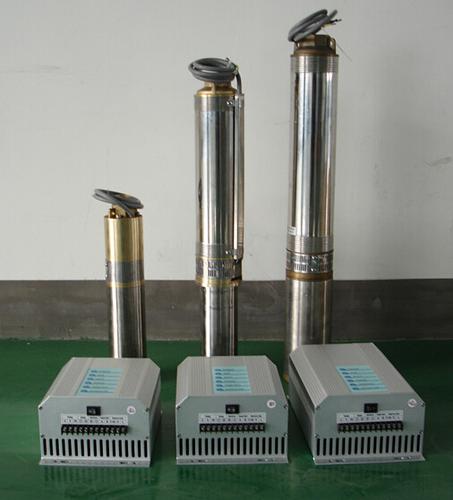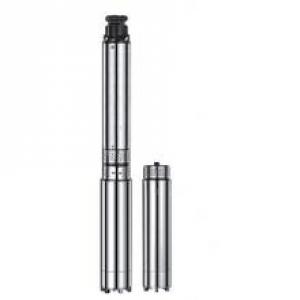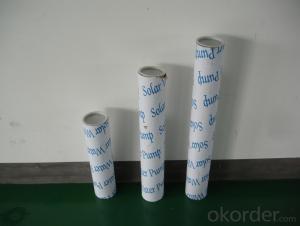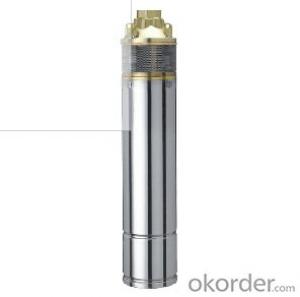Solar Deep Well Pump for A Pond
- Loading Port:
- China Main Port
- Payment Terms:
- TT OR LC
- Min Order Qty:
- -
- Supply Capability:
- -
OKorder Service Pledge
Quality Product, Order Online Tracking, Timely Delivery
OKorder Financial Service
Credit Rating, Credit Services, Credit Purchasing
You Might Also Like
pecifications
solar deep well pump1 sensorless brushless permanent magnet motor
2 water lubricated bearing
3 9 patents
solar deep well pump
Here we provide videos for your further recognization of our pumps
http://www.tudou.com/programs/view/WZTPg24M11s/
http://www.tudou.com/programs/view/xIPzLJwrhUE/
- Q: Can a solar pump be used for fish farming or aquaculture?
- Yes, a solar pump can be used for fish farming or aquaculture. Solar pumps are a sustainable and cost-effective option for providing water circulation, aeration, and filtration in fish ponds or aquaculture systems. They can help maintain water quality, oxygen levels, and overall health of the fish, while reducing dependence on grid electricity or conventional pumping systems.
- Q: Can solar pumps be used for livestock watering?
- Yes, solar pumps can be used for livestock watering. Solar-powered water pumping systems can provide a sustainable and cost-effective solution for supplying water to livestock in remote areas where grid electricity is limited or unavailable. These pumps use solar energy to power the pump and move water from a source, such as a well or pond, to livestock watering troughs, ensuring a reliable and continuous water supply for the animals.
- Q: Can a solar pump be used for water supply in parks and gardens?
- Yes, a solar pump can be used for water supply in parks and gardens. Solar pumps are an efficient and sustainable solution for providing water in outdoor spaces, as they harness energy from the sun to power the pump. They are easy to install, operate silently, and require minimal maintenance. Additionally, solar pumps do not contribute to greenhouse gas emissions, making them an eco-friendly choice for water supply in parks and gardens.
- Q: Are solar pumps suitable for high water volume requirements?
- Yes, solar pumps are suitable for high water volume requirements. They can be designed and configured to handle large volumes of water and are capable of pumping water for various purposes such as irrigation, livestock watering, or even large-scale water supply systems. With advancements in technology, solar pumps have become more efficient and reliable, making them a viable option for meeting high water volume requirements in a sustainable and cost-effective manner.
- Q: What is the warranty on a solar pump?
- The warranty on a solar pump can vary depending on the manufacturer and specific model, but it typically ranges from 1 to 5 years.
- Q: What is the maximum suction depth of a solar pump?
- The maximum suction depth of a solar pump typically depends on various factors such as the pump's design, power, and the density of the fluid being pumped. However, most solar pumps have a maximum suction depth of around 6-8 meters (20-26 feet).
- Q: Can a solar pump be used for water supply in a desert?
- Yes, a solar pump can be used for water supply in a desert. Solar pumps are powered by solar energy, which is abundant in desert regions. They can efficiently draw water from underground sources, such as wells or boreholes, and provide a reliable water supply for various purposes, including irrigation, livestock watering, and domestic use. The use of solar pumps in deserts can contribute to sustainable water management and reduce dependence on fossil fuels.
- Q: Can a solar pump be used for fountain or decorative water features?
- Certainly, fountains or decorative water features can be powered by a solar pump. These pumps offer an environmentally friendly and cost-effective alternative to conventional electric pumps. Their design enables them to utilize the sun's energy and convert it into power for operating the pump, making them ideal for outdoor water features that lack access to electricity. Different sizes and capacities of solar pumps are available, allowing you to select the one that best suits the requirements of your fountain or decorative water feature. Moreover, installation is simple and maintenance is minimal, making solar pumps a convenient choice for enhancing the visual appeal of your outdoor area while being mindful of the environment.
- Q: Can a solar pump be used for water supply in dairy farms or livestock operations?
- Yes, a solar pump can be used for water supply in dairy farms or livestock operations. Solar pumps are a sustainable and cost-effective solution for providing water to livestock. They rely on solar energy to power the pump, eliminating the need for electricity or fuel. This makes them ideal for remote locations with limited access to electricity or where electricity costs are high. Solar pumps can be used for various water supply purposes in dairy farms and livestock operations. They can be used to fill water troughs, tanks, or ponds, ensuring a consistent and sufficient water supply for the animals. This is crucial for their hydration, health, and productivity. Solar pumps are highly reliable and require very little maintenance. They have a long lifespan and can operate efficiently for many years. Additionally, they are environmentally friendly, producing zero greenhouse gas emissions and reducing dependence on fossil fuels. Another advantage of using solar pumps in dairy farms or livestock operations is that they can be easily scaled up or down to meet the specific water requirements of the farm. They can be customized to handle varying water depths and flow rates, ensuring an adequate water supply for different types and sizes of livestock. Overall, solar pumps offer a sustainable and reliable solution for water supply in dairy farms and livestock operations. They reduce operational costs, minimize environmental impact, and provide a consistent and sufficient water supply to support the health and productivity of the animals.
- Q: How does a solar pump handle variations in sunlight?
- A solar pump typically incorporates a control system that adjusts the speed or power output of the pump in response to variations in sunlight. This allows the pump to maintain a consistent flow rate, even when sunlight intensity changes throughout the day or in different weather conditions.
Send your message to us
Solar Deep Well Pump for A Pond
- Loading Port:
- China Main Port
- Payment Terms:
- TT OR LC
- Min Order Qty:
- -
- Supply Capability:
- -
OKorder Service Pledge
Quality Product, Order Online Tracking, Timely Delivery
OKorder Financial Service
Credit Rating, Credit Services, Credit Purchasing
Similar products
Hot products
Hot Searches
Related keywords























